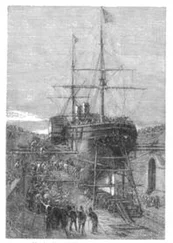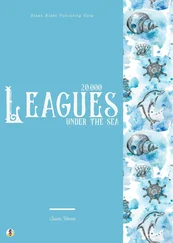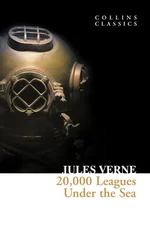Jules Verne - Twenty Thousand Leagues Under the Sea
Здесь есть возможность читать онлайн «Jules Verne - Twenty Thousand Leagues Under the Sea» — ознакомительный отрывок электронной книги совершенно бесплатно, а после прочтения отрывка купить полную версию. В некоторых случаях можно слушать аудио, скачать через торрент в формате fb2 и присутствует краткое содержание. Жанр: sf_writing, на английском языке. Описание произведения, (предисловие) а так же отзывы посетителей доступны на портале библиотеки ЛибКат.
- Название:Twenty Thousand Leagues Under the Sea
- Автор:
- Жанр:
- Год:неизвестен
- ISBN:нет данных
- Рейтинг книги:5 / 5. Голосов: 2
-
Избранное:Добавить в избранное
- Отзывы:
-
Ваша оценка:
- 100
- 1
- 2
- 3
- 4
- 5
Twenty Thousand Leagues Under the Sea: краткое содержание, описание и аннотация
Предлагаем к чтению аннотацию, описание, краткое содержание или предисловие (зависит от того, что написал сам автор книги «Twenty Thousand Leagues Under the Sea»). Если вы не нашли необходимую информацию о книге — напишите в комментариях, мы постараемся отыскать её.
Twenty Thousand Leagues Under the Sea — читать онлайн ознакомительный отрывок
Ниже представлен текст книги, разбитый по страницам. Система сохранения места последней прочитанной страницы, позволяет с удобством читать онлайн бесплатно книгу «Twenty Thousand Leagues Under the Sea», без необходимости каждый раз заново искать на чём Вы остановились. Поставьте закладку, и сможете в любой момент перейти на страницу, на которой закончили чтение.
Интервал:
Закладка:
What charming hours I passed thus at the window of the saloon! What new specimens of submarine flora and fauna did I admire under the brightness of our electric lantern!
There grew sponges of all shapes, pediculated, foliated, globular, and digital. They certainly justified the names of baskets, cups, distaffs, elk's-horns, lion's-feet, peacock's-tails, and Neptune's-gloves, which have been given to them by the fishermen, greater poets than the savants.
Other zoophytes which multiply near the sponges consist principally of medus? of a most elegant kind. The mollusks were represented by varieties of the calmar (which, according to Orbigny, are peculiar to the Red Sea); and reptiles by the virgata turtle, of the genus of cheloni?, which furnished a wholesome and delicate food for our table.
As to the fish, they were abundant and often remarkable. The following are those which the nets of the Nautilus brought more frequently on board:
Rays of a red-brick color, with bodies marked with blue spots, and easily recognizable by their double spikes; some superb caranxes, marked with seven transverse bands of jet-black, blue and yellow fins, and gold and silver scales; mullets with yellow heads; gobies, and a thousand other species, common to the ocean which we had just traversed.
The 9th of February, the Nautilus floated in the broadest part of the Red Sea, which is comprised between Souakin, on the west coast, and Koomfidah, on the east coast, with a diameter of ninety miles.
That day at noon, after the bearings were taken, Captain Nemo mounted the platform, where I happened to be, and I was determined not to let him go down again without at least pressing him regarding his ulterior projects. As soon as he saw me he approached, and graciously offered me a cigar.
"Well, sir, does this Red Sea please you? Have you sufficiently observed the wonders it covers, its fishes, its zoophytes, its parterres of sponges, and its forests of coral? Did you catch a glimpse of the towns on its borders?"
"Yes, Captain Nemo," I replied; "and the Nautilus is wonderfully fitted for such a study. Ah! it is an intelligent boat!"
"Yes, sir, intelligent and invulnerable. It fears neither the terrible tempests of the Red Sea, nor its currents, nor its sand-banks."
"Certainly," said I, "this sea is quoted as one of the worst, and in the time of the ancients, if I am not mistaken, its reputation was detestable."
"Detestable, M. Aronnax. The Greek and Latin historians do not speak favorably of it, and Strabo says it is very dangerous during the Etesian winds, and in the rainy season. The Arabian Edrisi portrays it under the name of the Gulf of Colzoum, and relates that vessels perished there in great numbers on the sand-banks, and that no one would risk sailing in the night. It is, he pretends, a sea subject to fearful hurricanes, strewn with inhospitable islands, and 'which offers nothing good either on its surface or in its depths.' Such, too, is the opinion of Arrian, Agatharcides, and Artemidorus."
"One may see," I replied, "that these historians never sailed on board the Nautilus."
"Just so," replied the captain, smiling; "and in that respect moderns are not more advanced than the ancients. It required many ages to find out the mechanical power of steam. Who knows if, in another hundred years, we may not see a second Nautilus? Progress is slow, M. Aronnax."
"It is true," I answered; "your boat is at least a century before its time, perhaps an era. What a misfortune that the secret of such an invention should die with its inventor!"
Captain Nemo did not reply. After some minutes' silence he continued:
"You were speaking of the opinions of ancient historians upon the dangerous navigation of the Red Sea."
"It is true," said I; "but were not their fears exaggerated?"
"Yes and no, M. Aronnax," replied Captain Nemo, who seemed to know the Red Sea by heart. "That which is no longer dangerous for a modern vessel, well rigged, strongly built, and master of its own course, thanks to obedient steam, offered all sorts of perils to the ships of the ancients. Picture to yourself those first navigators venturing in ships made of planks sewn with the cords of the palm trees, saturated with the grease of the sea-dog, and covered with powdered resin! They had not even instruments wherewith to take their bearings, and they went by guess among currents of which they scarcely knew anything. Under such conditions shipwrecks were, and must have been, numerous. But in our time, steamers running between Suez and the South Seas have nothing more to fear from the fury of this gulf, in spite of contrary trade winds. The captain and passengers do not prepare for their departure by offering propitiatory sacrifices; and, on their return, they no longer go ornamented with wreaths and gilt fillets to thank the gods in the neighboring temple."
"I agree with you," said I; "and steam seems to have killed all gratitude in the hearts of sailors. But, captain, since you seem to have especially studied this sea, can you tell me the origin of its name?"
"There exist several explanations on the subject, M. Aronnax. Would you like to know the opinion of a chronicler of the fourteenth century?"
"Willingly."
"This fanciful writer pretends that its name was given to it after the passage of the Israelites, when Pharaoh perished in the waves which closed at the voice of Moses."
"A poet's explanation, Captain Nemo," I replied; "but I cannot content myself with that. I ask you for your personal opinion."
"Here it is, M. Aronnax. According to my idea, we must see in this appellation of the Red Sea a translation of the Hebrew word "Edom'; and if the ancients gave it that name, it was on account of the particular color of its waters."
"But up to this time I have seen nothing but transparent waves and without any particular color."
"Very likely; but as we advance to the bottom of the gulf, you will see this singular appearance. I remember seeing the Bay of Tor entirely red, like a sea of blood."
"And you attribute this color to the presence of a microscopic seaweed?"
"Yes; it is a mucilaginous purple matter, produced by the restless little plants known by the name of trichodesmia, and of which it requires 40,000 to occupy the space of a square 0.04 of an inch. Perhaps we shall meet some when we get to Tor."
"So, Captain Nemo, it is not the first time you have overrun the Red Sea on board the Nautilus?"
"No, sir."
"As you spoke a while ago of the passage of the Israelites and of the catastrophe to the Egyptians, I will ask whether you have met with traces under the water of this great historical fact?"
"No, sir; and for a very good reason."
"What is it?"
"It is, that the spot where Moses and his people passed is now so blocked up with sand that the camels can barely bathe their legs there. You can well understand that there would not be water enough for my Nautilus."
"And the spot?" I asked.
"The spot is situated a little above the Isthmus of Suez, in the arm which formerly made a deep estuary when the Red Sea extended to the Salt Lakes. Now, whether this passage were miraculous or not, the Israelites, nevertheless, crossed there to reach the Promised Land, and Pharaoh's army perished precisely on that spot; and I think that excavations made in the middle of the sand would bring to light a large number of arms and instruments of Egyptian origin."
"That is evident," I replied; "and for the sake of arch?ologists let us hope that these excavations will be made sooner or later, when new towns are established on the isthmus, after the construction of the Suez Canal; a canal, however, very useless to a vessel like the Nautilus."
"Very likely; but useful to the whole world," said Captain Nemo. "The ancients well understood the utility of a communication between the Red Sea and the Mediterranean for their commercial affairs; but they did not think of digging a canal direct, and took the Nile as an intermediate. Very probably the canal which united the Nile to the Red Sea was begun by Sesostris, if we may believe tradition. One thing is certain, that in the year 615 before Jesus Christ, Necos undertook the works of an alimentary canal to the waters of the Nile, across the plain of Egypt, looking toward Arabia. It took four days to go up this canal, and it was so wide that two triremes could go abreast. It was carried on by Darius, the son of Hystaspes, and probably finished by Ptolemy II. Strabo saw it navigated; but its decline from the point of departure, near Bubastes, to the Red Sea was so slight that it was only navigable for a few months in the year. This canal answered all commercial purposes to the age of Antoninus, when it was abandoned and blocked up with sand. Restored by order of the Caliph Omar, it was definitively destroyed in 761 or 762 by Caliph Al-Mansor, who wished to prevent the arrival of provisions to Mohammed-ben-Abdallah, who had revolted against him. During the expedition into Egypt, your General Bonaparte discovered traces of the works in the Desert of Suez; and, surprised by the tide, he nearly perished before regaining Hadjaroth, at the very place where Moses had encamped three thousand years before him."
Читать дальшеИнтервал:
Закладка:
Похожие книги на «Twenty Thousand Leagues Under the Sea»
Представляем Вашему вниманию похожие книги на «Twenty Thousand Leagues Under the Sea» списком для выбора. Мы отобрали схожую по названию и смыслу литературу в надежде предоставить читателям больше вариантов отыскать новые, интересные, ещё непрочитанные произведения.
Обсуждение, отзывы о книге «Twenty Thousand Leagues Under the Sea» и просто собственные мнения читателей. Оставьте ваши комментарии, напишите, что Вы думаете о произведении, его смысле или главных героях. Укажите что конкретно понравилось, а что нет, и почему Вы так считаете.












